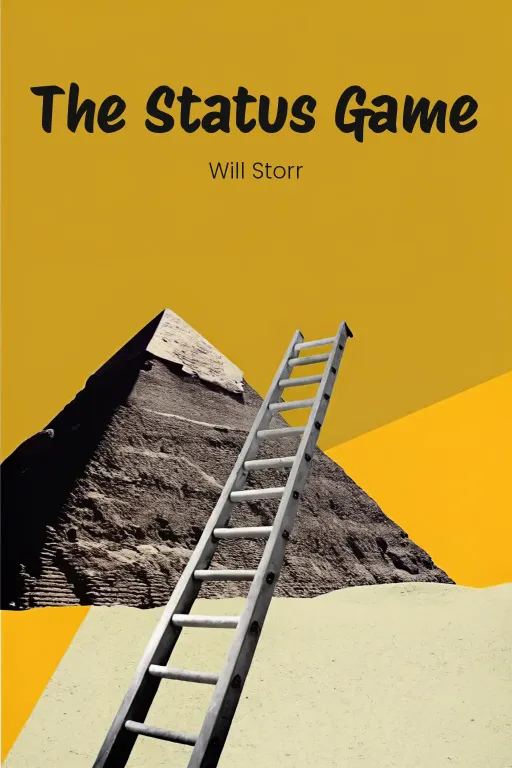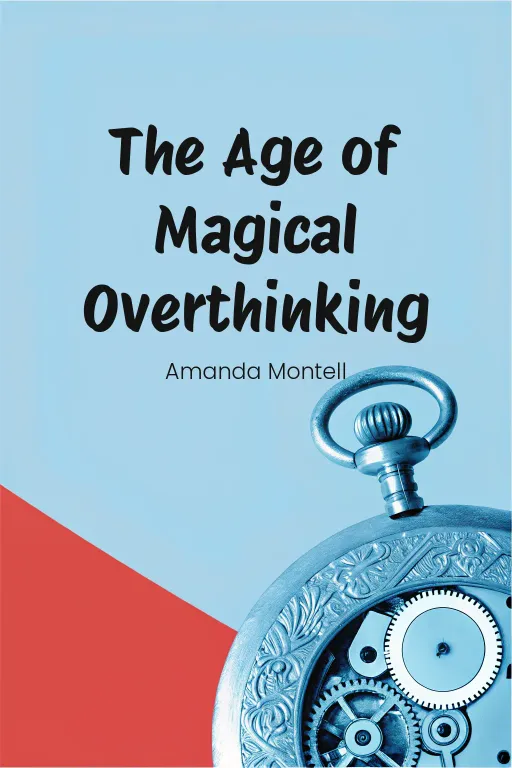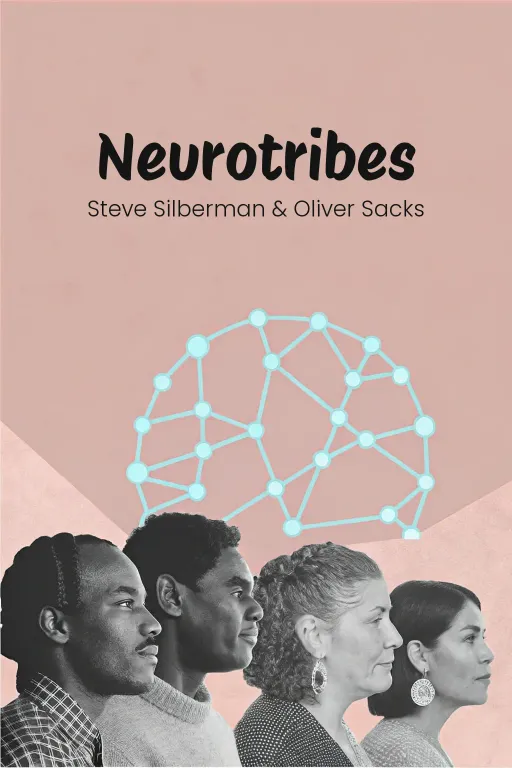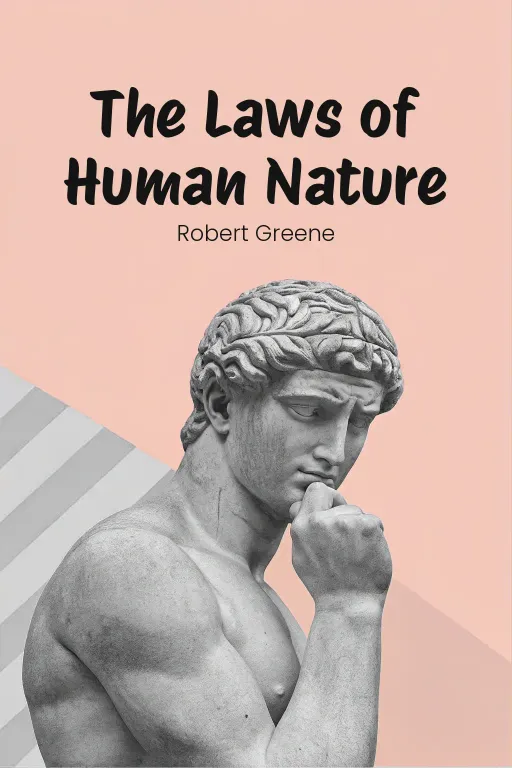
Decoding the Status Game: Win Without Losing You
Podcast by The Mindful Minute with Autumn and Rachel
On Human Life and How to Play It
Introduction
Part 1
Autumn: Hey everyone, welcome back! Quick question to kick things off: What do you think silently orchestrates your daily decisions, often without you even noticing? Is it money, love, or maybe ambition? What if I told you it's actually status? Rachel: Status? Like, who's got the corner office, or the most Insta followers? Seems a bit superficial to be the driving force behind everything, doesn’t it? Autumn: That's the common perception, Rachel! But that's where The Status Game by Will Storr comes in. It reveals status isn't just about those visible symbols, like titles or social media buzz. It's a deeply ingrained, primal drive – as crucial to us as food and shelter. Storr tracks how this pursuit of status has shaped everything from ancient tribal behavior to modern societies. It even touches our relationships and global conflicts. Rachel: Okay, so are you suggesting we're all just pawns in some invisible status game? That's a pretty strong statement. What kind of “games” are we even talking about here? Autumn: Storr breaks it down into three main categories: dominance games, which center on power and control; virtue games, where people compete through displays of morality; and success games, which are about achievement and expertise. Honestly, they're everywhere – at work, online, even within your family dynamics. And today, we're going to explore how these games have evolved, why they're so critical to us, and, most importantly, how we can become more aware of the game being played so we can stop running on autopilot and start playing smarter. Rachel: Sounds pretty intense. So, it's not just about figuring out who's the alpha, it's understanding why people are so obsessed with climbing corporate ladders, moralizing on social media, or obsess over an "Employee of the Month" award? Autumn: Precisely. We’ll dive into the evolutionary origins and neurobiology of status, then explore the games we both consciously and unconsciously play. We'll wrap up with strategies – like empathy and self-awareness – that empower you to navigate these dynamics authentically. You know, without losing yourself in the process. Rachel: Alright, decoding social hierarchies and leveling up without having to sell your soul? Now you've got my attention. Let's get into what this status thing is really all about.
The Nature of Status
Part 2
Autumn: Great! So, to get us started, let's dive into the fundamentals: the very nature of status. It's really about more than just “who's on top”. Think of status as this deeply ingrained emotional and social currency, something we've been using since our earliest ancestors formed tribes. It's not just about sheer material wealth or even physical strength. At its core, it's about survival and this fundamental sense of belonging. Rachel: Okay, Autumn, but I gotta ask: why would something as abstract as status suddenly become this survival mechanism? I mean, I understand the need for food and shelter, but why did “who's the most popular caveman,” really matter all that much? Autumn: Well, because in those small, tightly knit communities, your standing within the group could literally mean the difference between life and death. Back then, if you were respected and valued—be it for your hunting skills, wisdom, or even your knack for getting everyone to cooperate—it meant the group had your back. High status often translated into better access to resources, protection, finding a mate—you name it. Rachel: Aha! So you're saying, if I was a hunter-gatherer, being the MVP of the spring berry-picking league could actually keep me alive? Autumn: Exactly! And here’s something even more fascinating: status became more than just survival. It evolved into this feeling of safety, of being connected, and of emotional security. Your brain is hardwired to link status to your overall well-being. Studies have shown that when people feel valued by their peers—or have a high perceived status within their community—they report greater happiness and life satisfaction. It’s pretty universal. We're talking about data from across 123 countries showing this strong correlation. Rachel: Wait, so are you telling me that feeling “seen” or appreciated isn't just a nice little ego boost; it's actually essential to our emotional health? Autumn: Precisely. Recognition and validation are like essential emotional nutrients; they feed our sense of belonging and self-worth. And what's fascinating is, it's really not strictly dependent on wealth or power, you know? Status operates on a different level—one driven by how others see and respect your value within the group. Rachel: Hold on a second—so if status isn't just about money or authority, then how is it actually different? Isn't it all just power in disguise? Autumn: That's a great point to clarify. Will Storr actually makes this important distinction between wealth, power, and status. Wealth is about material resources, right? Power is about controlling other people’s actions. But status? Status is all about this emotional and social validation—what others think of your value, rather than what you actually own or the authority you wield. For example, think of a beloved teacher who's genuinely admired by their students. They might not have a ton of financial wealth or any real institutional power per se, but they hold immense status within that community. Rachel: Alright, I see where you're going. Status is basically like the applause you get when people recognize your contribution—it's not necessarily the money in the tip jar or the fancy manager’s title on your business card. But this all sounds a bit idealized. What happens when status starts going haywire, like, say, on social media? You've got people chasing likes like their lives depend on it. Autumn: Now you're getting into how our evolutionary wiring collides head-on with modern technology. Social media turns status into something you can actually count, right? Followers, likes, shares. It’s all so quantifiable and, frankly, addictive. A massive study of over 60,000 individuals found that constantly comparing ourselves to these seemingly perfect lives we see online leads to this downward spiral of inadequacy and anxiety, especially for younger users. Social media has essentially amplified the status games, making them relentless and emotionally draining. Rachel: Ugh. I can't help but think about how that morphs into echo chambers and tribalism. Take Maranda, for example—the woman who got deeply involved in anti-vaccine groups. Social media didn't just amplify her status-seeking; it actually rewarded her for doubling down on what turned out to be dangerous beliefs. The louder and more dogmatic she became, the more validation she got from her community—but at what cost? Didn't her child actually get sick because of those choices? Autumn: Exactly. Maranda’s case really highlights just how high the stakes can get when these status dynamics are left unchecked. The validation she received actually encouraged her to prioritize her standing within that group over rational decision-making, even to the clear detriment of her child’s health. Social media platforms create these competitive arenas where status becomes the ultimate motivator, often distorting our priorities in legitimately harmful ways. Rachel: So basically, social media is like this gladiator arena—or maybe a really trashy reality TV show—where we're all competing for recognition, but the real prize might just be making yourself absolutely miserable. That's… dark. Is there actually any way to win without losing your sanity completely? Autumn: That’s where it gets tricky. One of the key lessons from The Status Game is learning to recognize when you’re caught in an unhealthy status loop. Awareness is absolutely key. Noticing when you’re habitually comparing yourself to others or chasing some kind of superficial validation allows you to actually step back and recalibrate. And beyond that, it's about consciously choosing the games that are actually worth playing. Rachel: And by “worth playing,” I’m guessing you mean the ones that align with your actual values, and not just how many DMs you can rack up from complete strangers? Autumn: Precisely. Instead of competing for dominance or some kind of shallow success, focus on arenas where status serves a much deeper purpose—like cultivating really valuable skills, fostering meaningful relationships, or actually contributing something of value to a community. In fact, in collectivist cultures, status can often inspire cooperation rather than competition. Rachel: Wait, are you saying that there are cultures out there playing status games that don't involve one-upping someone on Twitter? Autumn: Absolutely. Take the island of Pohnpei, where status is largely gained through yam cultivation. It's not just about who grows, like, the biggest yam—it's about community recognition, shared effort, and this sense of collective pride. These status games are really rooted in cooperation and mutual respect, not tearing each other down. It's a reminder that status can truly be a force for good when it's genuinely tied to these collective goals. Rachel: Hmm, the story of the secret giant yam—kind of comforting, actually. Makes me wonder how we could cultivate something like that here. Autumn: It starts with shifting our focus. If status is ultimately, you know, inevitable because it's so deeply hardwired, then the real challenge is directing it into domains that really prioritize well-being—not just for ourselves, but for those around us. By understanding how it operates, we can really reshape the game to foster connection rather than just pure competition. Rachel: Alright, I'll admit, this is resonating. Status might be more profound than office politics or Instagram envy. It’s pretty fundamental, tied as much to mental health as it is to evolution. But that makes me wonder—what happens when the pursuit of status goes horribly wrong, especially on a societal level? I feel like we’re only scratching the surface here.
Status Games and Their Rules
Part 3
Autumn: So, understanding how status is fundamental really sets us up to look at how it shows up in social competition, right? Rachel: Totally. This whole idea of “status games”—I keep thinking about how they actually play out. Just what are the rules here? And how do we even know when we're competing, you know? Autumn: Right! That's perfect because it leads right into what Storr talks about: the rules of status games and how they're categorized. It’s really about taking this idea of status and breaking down the specific “games” people play to get it, which makes the theory super practical. Basically, he sees three main types—dominance, virtue, and success. Each has its own environment, its own “rules,” and the way people compete totally depends on which game they're in. Want to go through them one by one? Rachel: Absolutely. I love rules. So, dominance first, huh? How does that one work? Are we talking, you know, old-school kings and mafia bosses, or does it still happen in today’s office buildings? Autumn: Both, and more! Dominance status games are about taking control, using power, intimidating people, maybe even scaring them. It's where you find bullies, dictators, and – yes – that CEO who rules the room. The stakes are pretty high because, in this game, you have to make others do what you want without them fighting back. These people usually depend on some kind of strength – physical, social, or even the power of an institution – to beat their rivals and stay on top. If you look back, dominance set up the pecking order in ancient tribes. Warlords used it to rule, and you still see it today in authoritarian governments or even in super competitive workplaces. Rachel: Okay, so it’s basically “strongest wins,” right? You're painting a pretty dark picture here – are there actual rules, or is it just a free-for-all where whoever shouts loudest or looks scariest wins? Autumn: There are rules, but they're not written down anywhere, you know? Strength isn't just muscles; it's about strategies that make people submit. Like, in business, it could be a boss who’s constantly micromanaging or undermining people to keep them scared. Or think about criminal gangs – their code might be about loyalty that's enforced by, you know, really harsh punishment if you step out of line. It’s control through fear, and the “winner” is the one who stays in charge the longest. Rachel: Wow, just hearing that makes me tired, but I see your point—that survival-of-the-fittest thing is just kind of baked into society, whether we like it or not. Okay, give me something a little less heavy. What about virtue games? Those sound… nicer. Autumn: Virtue status games are interesting because they flip the focus from power to, well, doing good. These games are about showing that you believe in the group's values, and that you can earn respect by being altruistic, honest, or just behaving ethically. Think about religious leaders, activists, people who give a lot of money to charity – they’re all players. They “win” by being examples of what their community thinks is virtuous. Rachel: So, basically, it's the kind of thing that gets you, you know, a gold star in Sunday school or a bunch of likes when you post pictures of yourself planting trees on Earth Day? Autumn: <Laughs> Well, yeah, but virtue games are more than just surface stuff. They can create real connection and a sense of belonging because the rewards – respect, admiration, a feeling like you're doing something worthwhile – are really satisfying in themselves. Think about social movements, like the civil rights movement in the '60s. Their ability to show courage and keep fighting for justice really raised their status, both in their communities and in history. Rachel: Right, but what happens when people... I don't know, weaponize virtue? Like, when someone acts virtuous just to get something out of it – think of companies “greenwashing” their image or politicians giving fake apologies. Autumn: Exactly, and that's a huge problem in virtue games today. Storr talks about it, especially about cancel culture. A tiny mistake – or even just something someone thinks is a mistake – can suddenly put you in the middle of a moral war, where people jump in to prove how virtuous they are by attacking you. Remember Karen Templer, the knitter? It wasn't about her knitting, right? Her comments about India sparked a huge backlash because people thought she was supporting colonialist ideas. Her critics gained status by showing they were morally superior, at her expense. Rachel: Wow, double-edged sword, huh? One minute you’re the hero, the next you’re the villain. Speaking of which, doesn't this get, like, super-charged by Twitter and all the other social media stuff? Autumn: Oh, absolutely! Social media has turned virtue status games into a pressure cooker. It’s not about quietly doing good things; it’s often about making a big show of it—and trying to get noticed never stops. That’s why collective behavior in virtue games often goes to extremes. It's more about performing than actually making real change. Rachel: Fantastic. So, dominance games sound terrifying, and virtue games sound exhausting. Let me guess, success games aren't exactly a picnic either? Autumn: They're definitely competitive! Success games are all about what you can actually measure – awards, promotions, or really being good at something that others value. You see these games most clearly in places where it’s all about how well you perform, like in offices or on sports teams, where you can see who’s winning and who’s not. The rewards are real – money, trophies, or just being respected – and the people who do well in this space are usually very driven and focused on results. Rachel: Okay, so success games seem… cleaner, somehow. There's a scoreboard, at least in theory. What could make this a bad game to play? Autumn: Well, it’s not that success games are bad in themselves. But they can turn toxic if they lead to being too competitive, or if you start thinking that your worth as a person depends entirely on what others think of you. Remember that junior employee I mentioned? Mimicking their boss’ habits to gain trust and seem more competent? That mimicking works – until it doesn't. If you’re just playing the game to get ahead, you’ll probably end up sacrificing teamwork, creativity, or even your own well-being. Rachel: Alright, so here's what I'm getting so far: dominance games scare you, virtue games judge you, and success games wear you out. Are there any status games where we can all just, you know, get along? Autumn: There’s hope, Rachel! But first, before we dive into the collaborative potential of status games, I want to highlight mimicry again because it’s such a subtle yet significant mechanic in all three games. Mimicking someone’s behavior or speech signals respect and desire for inclusion. It’s why you unconsciously match a mentor’s body language or why shared laughter bonds people instantly. It builds bridges. Rachel: True, until it doesn't. You also said it creates resentment sometimes, right? Like the junior employee trying to match their boss and just annoying the team instead? Autumn: Exactly. Mimicry is context-dependent—it soothes connections but can also highlight a rung on the ladder some would rather not see. It’s fascinating how something so subconscious can reveal and exacerbate hierarchical tension. Rachel: Alright. So, now we know the rules: survival-of-the-fittest for dominance, morality and approval for virtue, and achievement for success. But the question still stands – how do you navigate these games without losing your mind? Or your principles?
Navigating Status Games
Part 4
Autumn: So, now that we've laid out the rules of status games, let's dive into how this plays out in the real world. I think this is where it gets really interesting because we can consciously start to navigate these dynamics. How do we actually shift from being caught in that competitive cycle to playing the game in a way that’s healthy, and aligned with our values? Rachel: Exactly, because so far, it sounds like we're all doomed to play these status games whether we like it or not. Is it really possible to “navigate” them without, you know, completely isolating yourself, or worse, selling out your soul? Autumn: Well, Storr argues that you don’t have to opt out. Instead, you can consciously navigate status hierarchies by recognizing the subconscious cues, fostering empathy, and redefining success in a way that actually benefits you and your community. It all comes down to intention. So let's start with those subconscious cues. Rachel: Ah, you mean those little things we don’t even realize we are picking up on, right? Body language, tone of voice, who's dominating the room during meetings—that kind of stuff? Autumn: Exactly! Those subtle social signals that tell us who's "winning" or even just who feels comfortable. Think about the workplace: someone leans in during a discussion, speaks confidently, and makes direct eye contact. Subconsciously, they might be asserting dominance, and we start adjusting our positions in the hierarchy. It's all in our brains. They’ve been trained over millions of years to pick up these cues because it used to mean survival. Rachel: So, someone leans forward, and suddenly we’re back in the Stone Age thinking. "Wow, this person might steal my mammoth meat, I have to defend myself!" Autumn: <Laughs> Pretty much! And that's where the trouble starts. These instincts were designed for life-or-death situations, but nowadays, those instincts just fuel insecurity or competitiveness instead of collaboration. If someone feels threatened by that confident colleague, they might get defensive, passive-aggressive, or even start nitpicking their work. Recognizing those triggers is the first step to breaking that cycle. Rachel: Okay, so instead of fighting fire with fire or feeling defeated, you're saying we need to take a step back, realize what’s happening, and respond thoughtfully? Autumn: Exactly. Responding assertively, not defensively. For instance, instead of thinking, “Why is this person trying to push me out?” you could focus on constructive engagement, like acknowledging their idea while contributing your own. That way, you can participate without escalating the tension or feeling steamrolled. Rachel: Okay, but what if someone is just...impossible? You know, that one colleague who sees every meeting as their chance to dominate. What do you do when playing nice just doesn't work? Autumn: Well, sometimes it's about setting boundaries. You can hold your own without being aggressive. For example, instead of trying to outshine that colleague, try to steer the conversation back to the team’s goals like: "That’s a great point, and I think it could tie into what we've been working on as a team.” It shows that you value collaboration and subtly shifts the focus away from individual dominance. Rachel: So, ultimately, the trick is to keep your cool and remember—it’s not about "beating" anyone. Autumn: Exactly, and that leads to the second part: fostering empathy and genuine connections with others. Instead of just seeing status as a competition, you can use it to build trust and foster a more collaborative atmosphere. Rachel: Okay, I get the theory. But what does that actually look like? What does "fostering connection" really mean in practice? It can be tough to pull people out of that competitive mindset. Autumn: It can, but small, deliberate actions make everything different. For example, imagine a team leader who starts meetings by acknowledging everyone's contributions by saying: "Thanks to Alex for streamlining our campaign and to Jamal for stepping up on client calls. These wins show our hard work together.” That validation diffuses competition—it aligns individual success with the group effort, which strengthens collaboration. Rachel: Hmm. So, instead of just shouting out "Here's who crushed it this week," you highlight how everyone's contributions helped the whole team thrive. Autumn: Exactly, but it goes beyond that. Simple gestures matter too—checking in on someone's well-being or asking about their hobbies. These things show that people are valued, not just for their role, but as individuals. It shifts the game from pure hierarchy to genuine connection. Rachel: I like the idea, but isn't there a risk that people will still focus on status? Like, "Oh great, now I'm competing to be the office favorite?" Autumn: That's a valid concern, and that’s why consistency matters. If that kind of behavior becomes a consistent part of how you interact with a group—practicing gratitude regularly or encouraging collaboration—it establishes a culture of mutual respect. The competition doesn’t disappear, but it becomes healthier. Rachel: Alright, I'll admit that sounds appealing. But what about reframing success? Status is so often tied to climbing the ladder—how can you "reframe" success if the endgame is about reaching the top? Autumn: Well, instead of seeing success as a win-lose game, think of it as collective growth. In workplaces, that could mean shifting from celebrating individual victories to focusing on team achievements. For example, instead of just rewarding the person who closes the biggest deal, you emphasize how the whole team played a role in getting that client onboard—even the smaller contributions like research. Rachel: Hmm, so you’re basically encouraging shared wins instead of individual ones. Doesn't that kind of deflate motivation if the star players feel overshadowed? Autumn: It could, if it's not done right. It’s not about erasing individual achievements—it’s about linking them to the group success. When people feel part of something bigger, they're often more motivated because the stakes aren't solely on their shoulders. Besides, a collaborative environment usually outweighs what you lose in solo recognition. Rachel: You’re making it sound like a Disney movie where we all hold hands and sing kumbaya. But real talk—what about situations like Maranda’s in that vaccine group? That’s a case where her status within the group depended on reinforcing dangerous beliefs. How do you reframe success or connection when the stakes are literally harmful? Autumn: That's where it gets complicated. In toxic environments, status often becomes about conformity, even at the expense of personal integrity, like Maranda staying in the group despite her misgivings. The challenge and the solution is creating spaces where validation doesn’t depend on suppressing individuality. In healthier groups, success can be reframed as encouraging critical thinking alongside belonging, not requiring blind loyalty. Rachel: So, you're saying it's about building spaces where you can be part of the group without losing yourself? Easier said than done, Autumn. Autumn: It is, but it’s possible. And mindfulness can really help. By staying self-aware, you can step back and ask, "Am I seeking validation here for something meaningful or something harmful?" That pause can change everything. Rachel: Alright, so key takeaway: awareness, connection, and mindful reframing. But if social media is the status game’s ultimate amplifier, how do we bring these strategies to such chaotic environments? Autumn: It’s about strengthening real-life spaces where status doesn’t warp into endless competition. Social media might dominate, but when your in-person relationships and communities reflect healthier dynamics, you’re less likely to fall into toxic patterns online. That combination of context and personal intention is how we navigate status games smarter—not harder.
Conclusion
Part 5
Autumn: Okay, so to bring it all together, “The Status Game” really highlights that our pursuit of status isn't just about chasing likes or awards. It's actually hardwired into us, tied to our need to survive, belong, and feel good, you know emotionally. These status dynamics, whether it’s about dominance, virtue, or chasing success, they're playing out in every area of our lives, affecting everything from our relationships to how we see ourselves. Rachel: Right, and while these games can encourage teamwork, they can also turn pretty nasty, especially with social media amplifying everything. So, it's not about ditching status altogether – I mean, we can't really. It's more about being aware of the games, picking the ones that actually matter to us, and making sure they align with values that make our lives and communities better. Autumn: Precisely. Status is kind of unavoidable, but if we focus on being empathetic, redefining what success means, and creating healthier environments, we can shift it from being a competition to something that connects us. Actually, here’s a question: What if the games we played actually put the well-being of everyone ahead of just personal gain? Rachel: Yeah, that's something to chew on next time you’re on Instagram or checking out a colleague. Always remember, the game is always on, but it's how you decide to play that counts.









